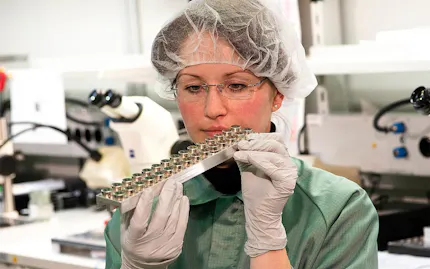![]() 2020-07-03Video THERMAL-CHECKLearn more about detection of elevated body temperatureRead on
2020-07-03Video THERMAL-CHECKLearn more about detection of elevated body temperatureRead onWatch the video to see how the measurement of the detection of elevated body temperature itself is performed and what you need to be aware of.
![placeholder placeholder]() 2020-05-26Special Times Call for Special Measures – InfraTec Responds to the Effects of the Corona PandemicExtra shifts for the supply of key detectors to combat the corona pandemicRead onDownload ZIP-File (11504 kB)
2020-05-26Special Times Call for Special Measures – InfraTec Responds to the Effects of the Corona PandemicExtra shifts for the supply of key detectors to combat the corona pandemicRead onDownload ZIP-File (11504 kB)With the current corona crisis, the world is facing a multitude of challenges. First and foremost is the protection of public health. The SARS-CoV-2 virus known as "Coronavirus" causes an infection of the respiratory tract. At present, only the symptoms, but not the disease itself, can be treated.
- 2020-04-17Thermographic Cameras Help to Contain the Corona PandemicInfraTec supplies high-resolution thermographic cameras for detecting elevated body temperatureRead onDownload ZIP-File (1327 kB)
The pandemic triggered by the coronavirus currently poses enormous challenges to public life and health care systems worldwide. InfraTec supplies high-resolution thermographic cameras for detecting fever and elevated body temperature.
- 2020-04-06Significant Increase in Performance – Frame Rate Exceeds 100 kHz LimitAdvanced High-speed ImageIR® 5300 Infrared Camera Offers Even More Performance When Recording Thermal Images of Extremely Fast Thermal ProcessesRead onDownload ZIP-File (3815 kB)
For some years now, the ImageIR® 5300 has been the top model in terms of temporal resolution within the high-end camera series ImageIR® from InfraTec. This special position is attributable to its detector.
- 2020-03-10How to Measure Wind TurbinesScientists from Bremen and Hannover develop novel measuring system for wind turbinesRead onDownload ZIP-File (480 kB)
Researchers from the Center for Wind Energy Research (ForWind) are developing a new measuring system together with partners from industry, which for the first time will record and visualize the flow behavior of the rotor blades directly on wind turbines during operation.




